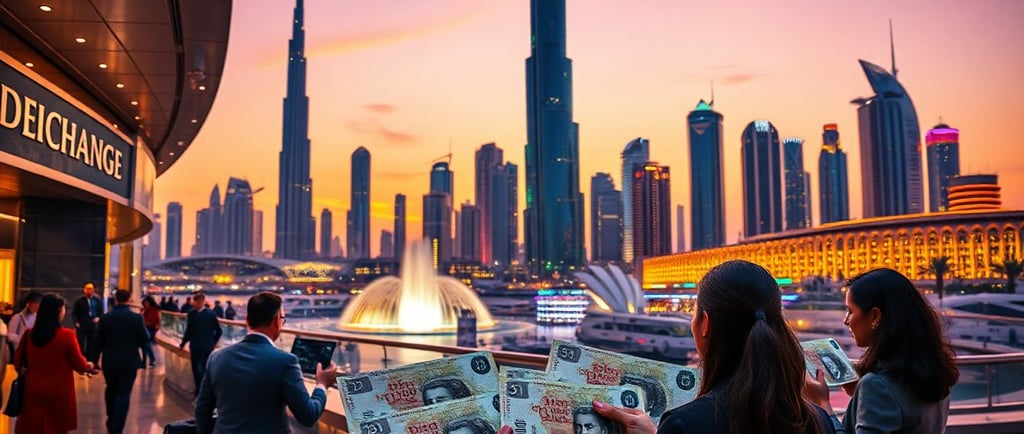What is the currency in dubai united arab emirates?
Traveling to Dubai? Learn everything about the UAE Dirham (AED)—exchange rates, tips, digital payments, and how to handle money smartly.
7/25/20254 min read


Dubai stands out as a shining star in the world of finance and tourism. Every year, millions of visitors flock here to explore its stunning skyscrapers, luxury shopping, and vibrant culture. But understanding the local money is key to making your trip smooth and your investments smart. Knowing the currency helps you avoid confusion, get good exchange rates, and enjoy your stay without guesswork. This article covers everything you need to know about Dubai’s money—its name, history, denominations, how to exchange it, and future changes.
The Official Currency of Dubai and the United Arab Emirates: The UAE Dirham (AED)
Overview of the UAE Dirham
The currency used in Dubai is called the UAE dirham. It’s the same across all seven emirates, including Abu Dhabi, Sharjah, and Dubai. You'll usually see it abbreviated as AED or written in Arabic as د.إ. The dirham is the backbone of Dubai's economy, used everywhere from luxury stores to street markets.
The Central Bank of the UAE
This currency is managed by the Central Bank of the UAE. They control how much money is in circulation and keep the dirham stable. They also issue new bills and coins, making sure the currency stays secure and trustworthy. The bank works hard to keep inflation in check and the economy balanced.
Historical Evolution of the Currency
Before settling on the AED, Dubai used other currencies like the Indian rupee and the Gulf rupee. When oil money started flowing in the 1960s, the government introduced the dirham as a modern, stable currency. Over the years, the dirham has gone through some redesigns, but it has remained strong against other currencies.
Denominations and Forms of the UAE Dirham
Banknotes
Banknotes are your go-to paper money in Dubai. They come in various sizes and designs. Common notes include denominations of 5, 10, 50, 100, 200, 500, and even 1,000 dirhams. Each note features famous landmarks or cultural symbols, with security features like holograms and color-shifting ink to prevent counterfeiting.
Coins
Coins are used mainly for smaller purchases. You’ll find coins in the denominations of 1, 5, 10, 25, and 50 fils. The “fils” are like cents in dollars but are less common for everyday shopping. Coins are handy for little things like buying snacks or paying for transit.
Digital and Electronic Payments
Cash is just part of Dubai’s payment scene now. Mobile wallets, credit cards, and online banking are everywhere. Many shops and restaurants prefer card payments. Digital transactions are quick, safe, and highly convenient, especially for travelers who want to avoid carrying too much cash.
Currency Exchange and Valuation
Current Exchange Rates
The dirham’s value fluctuates daily but generally stays steady against major currencies. For example, 1 USD usually equals about 3.67 AED. You’ll want to check real-time rates before exchanging money, especially if the dollar, euro, or pound is involved. Fluctuations happen based on world markets, so staying informed helps you get the best deal.
Where to Exchange Currency in Dubai
Dubai has plenty of options for changing money. Major banks, dedicated exchange offices, airports, and even some hotels offer currency exchange services. To get the best rates, compare a few places. Avoid exchange kiosks with suspiciously high fees to save money.
Using ATMs and Banking Facilities
ATMs are everywhere, from shopping malls to airports. Using them is easy, but keep an eye on withdrawal fees. If you’re traveling from abroad, notify your bank to avoid card blocks. Carry a backup card in case one fails, and consider using prepaid travel cards for better control over spending.
Practical Tips for Handling Currency in Dubai
Avoiding Counterfeit Money
Fake banknotes do exist, so check for security marks like holograms, watermarks, and color-shifting ink. Feel the texture of genuine bills—they should be crisp and smooth. When paying large amounts, inspect notes carefully to avoid problems.
Spending and Budgeting
Dubai can be expensive, especially for hotels, shopping, and dining. Budget wisely based on your plans. For a quick idea, basic meals can cost about $10-$20, while luxury hotels may charge hundreds per night. Set a spending limit to stay stress-free and enjoy your trip more.
Tipping and Currency Usage Etiquette
Tipping isn’t mandatory but appreciated. It’s common to leave about 10% at restaurants if service isn’t included. When paying, most prefer cash, but cards are accepted worldwide. Carry small bills for tips and small purchases, and remember, respecting local customs makes your visit more enjoyable.
Future Trends and Developments in Dubai's Currency Scene
Digital Currency Initiatives
Dubai is testing new ways to use digital money. They’re exploring blockchain and fintech innovations to create faster, safer transactions. Imagine paying with a tap or a digital token—this is where Dubai wants to lead. The city aims to be a hub for innovative money solutions by 2025.
Currency Stability and Economic Factors
Dubai’s economy is strong thanks to oil, tourism, and real estate. Its currency remains stable because the government carefully manages economic policies. However, global shifts or regional issues could influence the dirham’s value, so staying informed helps travelers and investors plan better.
Conclusion
The UAE dirham is the official currency in Dubai, symbolizing the city’s status as a global financial hub. With notes, coins, and digital forms, handling money here is straightforward. Remember to check exchange rates, use secure methods, and plan your spending carefully. As Dubai moves toward digital currencies, your experience with money will evolve. Whether you’re visiting or investing, understanding the dirham helps you make smarter decisions and enjoy everything Dubai has to offer.
EmiratesHotels.org
Discover blogs, book hotels, and flights easily.
© 2025. All rights reserved.